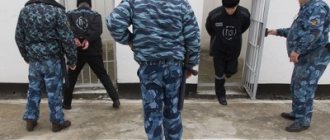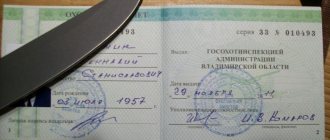Criminal Code of the Russian Federation in the latest edition:
Article 127 of the Criminal Code of the Russian Federation. Unlawful imprisonment
1. Illegal deprivation of a person’s liberty, not related to his abduction, -
shall be punishable by restriction of freedom for a term of up to two years, or forced labor for a term of up to two years, or arrest for a term of three to six months, or imprisonment for a term of up to two years.
2. The same act committed:
a) by a group of persons by prior conspiracy;
b) has become invalid. — Federal Law of December 8, 2003 N 162-FZ;
c) with the use of violence dangerous to life or health;
d) using weapons or objects used as weapons;
e) in relation to a known minor;
f) in relation to a woman who is known to the perpetrator to be pregnant;
g) in relation to two or more persons, -
shall be punishable by forced labor for a term of up to five years or imprisonment for a term of three to five years.
3. Acts provided for in parts one or two of this article, if they were committed by an organized group or caused by negligence the death of the victim or other grave consequences, -
shall be punished by imprisonment for a term of four to eight years.
Return to the table of contents of the document: Criminal Code of the Russian Federation in the latest edition
Comments on Article 127 of the Criminal Code of the Russian Federation
Unlike kidnapping (Article 126 of the Criminal Code of the Russian Federation), in case of unlawful deprivation of liberty, the victim is not captured, not taken from his environment, not abducted, but remains in place, but is limited in movement.
Object of crime . The immediate object of the crime is the physical freedom of a specific victim(s).
An additional object may be the safety of life, health of the victim, his relatives, property relations, etc.
The objective side of the crime is characterized by actions to deprive the victim of the opportunity to freely, of his own free will, move in space and determine his place of stay.
Deprivation of freedom of movement does not necessarily imply complete immobilization (tying up) of the victim; as a result of committing a crime, the latter may retain the ability to move, but in a limited area controlled by the offender (for example, within a guarded dacha, other premises or area of the area).
A distinctive feature of unlawful deprivation of liberty from kidnapping is the absence of movement , i.e. a person is kept in the place where he was of his own free will.
The actions of a guilty person who has kidnapped a person and illegally detained him are qualified under Art. 126 of the Criminal Code of the Russian Federation and additional qualifications under Art. 127 of the Criminal Code of the Russian Federation is not required. The victim is illegally, forcibly, against his will, held in the place where he himself was voluntarily before , he is deprived of the opportunity to move at his own discretion, to communicate with other people. For example, a person is locked in his own house, apartment, office, closet, basement, etc.; tied up and kept in any room; left without life-saving equipment on the island so that he cannot leave it on his own, etc.
In the case where the guilty person, who initially illegally deprived a person of his freedom, subsequently moved the victim to another place, the act is qualified under the relevant part of Article 126 of the Criminal Code of the Russian Federation without additional qualification under Article 127 of the Criminal Code of the Russian Federation (clause 4 of the Resolution of the Plenum of the Supreme Court of the Russian Federation dated December 24. 2019 N 58 “On judicial practice in cases of kidnapping, unlawful imprisonment and human trafficking”).
The threat of murder or infliction of grievous bodily harm during unlawful deprivation of liberty should be qualified according to the totality of crimes provided for in the relevant part of Article 127 of the Criminal Code of the Russian Federation and Article 119 of the Criminal Code of the Russian Federation (clause 5 of the Resolution of the Plenum of the Supreme Court of the Russian Federation of December 24, 2019 N 58).
The elements of the crime are formal, the crime is considered completed from the moment of actual deprivation of liberty, regardless of the duration of the victim’s detention (in this case, it is necessary to take into account the provisions of Part 2 of Article 14 of the Criminal Code of the Russian Federation, which can be applied in the case of short-term deprivation of liberty).
If a person is deprived of his liberty with his consent, but is subsequently detained against his will, then the perpetrator must be held liable for unlawful deprivation of liberty.
In the case of legal deprivation of liberty (for example, a minor based on his interests; with the consent of the victim; as a measure of state coercion, etc.) criminal liability under Art. 127 of the Criminal Code of the Russian Federation is excluded.
Connection with another act
In practice, it often happens that before illegally isolating a person from society and depriving him of his freedom, attackers first commit another crime - kidnapping. The latter is characterized by the fact that a person is taken from one place and forcibly transported to another, and then locked in a certain room and held there. Thus, two acts are committed at once: kidnapping and illegal restriction of a person’s freedom. Sanctions for these crimes are contained in Art. 126, 127 of the Criminal Code of the Russian Federation.
Circumstances eliminating criminal liability for depriving a person of liberty
General provisions regarding possible lawful deprivation of liberty are contained in Art. 5 of the European Convention for the Protection of Human Rights and Fundamental Freedoms of November 4, 1950, according to which no one may be deprived of his liberty except in the following cases and in accordance with the procedure established by law:
- lawful detention of a person convicted by a competent court;
- the lawful detention or detention (arrest) of a person for failure to comply with a court order made in accordance with the law or to enforce the fulfillment of any obligation prescribed by law;
- the lawful arrest or detention of a person for the purpose of bringing him before the competent authority on reasonable suspicion of having committed an offense or when there are reasonable grounds for believing that it is necessary to prevent him from committing an offense or from escaping after having committed it;
- the detention of a minor under a lawful order for educational supervision or his lawful detention for the purpose of bringing him before the competent authority;
- the lawful detention of persons for the purpose of preventing the spread of infectious diseases, as well as the lawful detention of the mentally ill, alcoholics, drug addicts or vagrants;
- the lawful detention or detention of a person to prevent his unlawful entry into a country or of a person against whom action is being taken for his deportation or extradition.
Deprivation of liberty cannot be considered a crime:
- when a citizen exercises the right to detain a person who has committed a crime in a state of extreme necessity;
- with necessary defense;
- when executing an order or instruction;
- in cases where deprivation of freedom of movement is a reasonable measure applied by parents or persons replacing them in relation to children or pupils for the purpose of their upbringing;
- with the voluntary consent of the victim.
The subjective side is characterized by direct intent.
To correctly qualify the crime, it is important to establish the direction of the perpetrator’s intent . If deprivation of liberty acts as one of the forms of violence against the victim in a situation where the intent was not aimed at deprivation of liberty, but at the seizure of property, the use of violence during a robbery or extortion to seize property, murder, etc., qualification of the offense under Art. 127 of the Criminal Code of the Russian Federation is impossible.
However, if a person is deprived of his liberty after another crime has been committed against him, then the actions of the guilty person should be considered as unlawful deprivation of liberty.
For example, the culprit, having taken possession of the victim’s property and car, with the aim of depriving him of his freedom, locked him in the garage and disappeared. The actions of the culprit in this case are qualified under paragraph “a” of Part 3 of Art. 162 and part 1 of Art. 127 of the Criminal Code of the Russian Federation.
The motives and purposes of unlawful deprivation of liberty can be anything (revenge, facilitating or concealing the commission of another crime, etc.) and do not affect qualifications.
The subject of the crime is a sane individual who has reached the age of 16.
Responsibility for the unlawful deprivation of a person’s liberty committed by an official is established by Art. 286 of the Criminal Code of the Russian Federation or for crimes against justice - illegal detention, detention or detention (Article 301 of the Criminal Code of the Russian Federation), imposition of an illegal court sentence to imprisonment (Part 2 of Article 305 of the Criminal Code of the Russian Federation). Additional qualifications under Art. 127 of the Criminal Code of the Russian Federation is not required in these cases.
What you need to know
If one person illegally deprives another citizen of freedom, then this is regarded as a crime and is subject to punishment under Art. 127 of the Criminal Code of the Russian Federation. In this case, the person does not move anywhere from the place where he is. A person can simply be locked in a room, thereby depriving him of freedom of movement and action. This act is considered completed at the moment when the attackers have committed their intent, in other words, against the will of the citizen, they have isolated him from society. When determining the qualification of a given act, the purpose and motive of the act will not matter.
Qualified offenses of unlawful deprivation of liberty
Qualifying (part 2 of Article 127 of the Criminal Code of the Russian Federation) and specially qualifying signs (part 3 of Article 127 of the Criminal Code of the Russian Federation) are similar to the corresponding signs that form qualified and especially qualified elements of kidnapping (parts 2 and 3 of Article 126 of the Criminal Code of the Russian Federation), and have identical content, with the following exceptions. In part 2 art. 127 of the Criminal Code of the Russian Federation does not contain the sign “for selfish motives”, and when understanding such a sign as the use of violence dangerous to life and health (clause “c” of Part 2 of Article 127 of the Criminal Code of the Russian Federation), one should proceed from the fact that it covers physical violence resulting in only mild or moderate harm to health. Causing serious harm to health is subject to independent qualification under Art. 111 of the Criminal Code of the Russian Federation. Let us recall that the threat of murder or infliction of grievous bodily harm during unlawful deprivation of liberty should be classified as a set of crimes provided for in the relevant part of Article 127 of the Criminal Code of the Russian Federation and Article 119 of the Criminal Code of the Russian Federation. Any other mental impact on a person is covered by the main elements of the crime (Part 1 of Article 127 of the Criminal Code of the Russian Federation).
If other crimes are committed during unlawful deprivation of liberty, then the crime is classified as a totality of acts. For example, if deprivation of liberty is accompanied by extortion, then such actions form a set of crimes provided for in Art. 127 and 163 of the Criminal Code of the Russian Federation.
Punishment
According to Article 127 of the Criminal Code of the Russian Federation, unlawful deprivation of liberty, which does not have signs of kidnapping, is punishable by:
note
In judicial practice, there is a practice of deprivation of liberty in the form of illegal placement in a psychiatric hospital. As a rule, attackers do this for selfish purposes - in this way they “softly eliminate” the victim and take possession of his property. You can read more details in this article.
- restriction of freedom for two years;
- forced labor for a period of two years;
- arrest ranging from three to 6 months;
- imprisonment within two years.
A more severe punishment is provided for such a crime, namely forced labor or imprisonment for up to five years, if it was committed:
- by several persons on the basis of a preliminary conspiracy;
- with violence that posed a danger to the life and health of the victim;
- using weapons or other objects that can be used as weapons;
- in relation to a child, a pregnant woman (if the perpetrator knew about it) or two or more persons.
If, as a result of an illegal restriction of freedom of movement, the death of the victim occurs, then the perpetrator faces imprisonment for a term of 4 to 8 years.
Practice
The young man invited the girl to his place for tea. The latter accepted the guy’s offer and came to his apartment. After some time, the man began to pester his girlfriend and wanted to have an intimate relationship with her, but the woman refused him. Then the guy decided to teach the girl a lesson and locked her in the apartment for the whole day. The latter could not get out of there, he closed the door from the outside, the handle would not turn, and the woman did not have a phone with her to call the police.
She spent the whole day like that until the man came and opened it. The girl contacted the police. Law enforcement agencies opened a case against the young man for unlawful deprivation of liberty. Art. 127 of the Criminal Code of the Russian Federation even threatened him with imprisonment for up to two years. At the trial, the man admitted his guilt. The judiciary sentenced him to one year probation.
Concepts, signs.
Guided by Article 127 of the Criminal Code of the Russian Federation, unlawful deprivation of liberty is the deprivation of the victim of the real opportunity to move in an unlimited space at his own request, detention in a room, tying up, forcible confinement, etc.
The law provides for strictly defined cases of deprivation of liberty by a state body:
1) Administrative detention; 2) Forced hospitalization in a psychiatric hospital; 3) Measures of criminal procedural coercion; 4) Criminal punishment.
The subject of the crime is exclusively a private person who has reached the age of 16. If this crime is committed by officials, they will be held accountable for abuse of power, abuse of power, or for crimes against justice. In these cases, the only distinction between these crimes will be whether the subject is an official or a private person.
The subjective side - deprivation of liberty is characterized only by direct intent, when the perpetrator realizes that he is unlawfully depriving another person of liberty and desires it. The motive for this crime may be revenge, facilitating the commission of another crime, self-interest, hooliganism and other motives.
A citizen has the right to detain another person only in necessary defense or if this person commits a crime or if absolutely necessary. Other cases of detaining a person are unlawful deprivation of liberty.
In case of unlawful deprivation of liberty, the victim can be any person, regardless of gender, age, ability to recognize the fact of deprivation of liberty and other signs and qualities that characterize a person.
Corpus delicti
In illegal deprivation of liberty, the corpus delicti consists of the intentional unlawful behavior of the subject of the unlawful deprivation of a person’s freedom; it may be a crime against the individual and his freedom, which is protected by the state.
Society is interested in its citizens managing their own freedom and responsibly approaching this invaluable resource.
A person illegally deprived of his freedom loses, among other things, the opportunity to work for the good of society and perform socially useful work.
The object of illegal deprivation of liberty is a person’s personal freedom (physical), which is attacked by illegally detaining a person and restricting him in the use of his rights.
associated with it, that is:
- The fact of holding a citizen without his consent;
- The place where the victim was held;
- The time that the hold lasted;
- The means by which the retention was made;
- The conditions in which the detained citizen (citizen) was kept;
- Other factors that relate to the commission of a crime and can be provided as evidence of the crime committed.
The subject of unlawful deprivation of liberty is an attacker who has committed a criminal act, has reached the age of 16 years and is mentally competent. The subjective side of the unlawful deprivation of a person’s freedom is expressed in the degree and reason for the subject’s personal interest in committing a crime:
- Goals;
- Motives;
- The relationship that connected him with the victim;
- Possible state of alcohol intoxication;
- The general psychological state against which the unlawful act was committed;
- Values and beliefs, as well as other factors that oriented a person to commit a crime.
The subjective side of unlawful deprivation of liberty in relation to another person can reveal new facets or nuances of the act, which will significantly mitigate the punishment, especially in conjunction with the sincere repentance of the offender.





